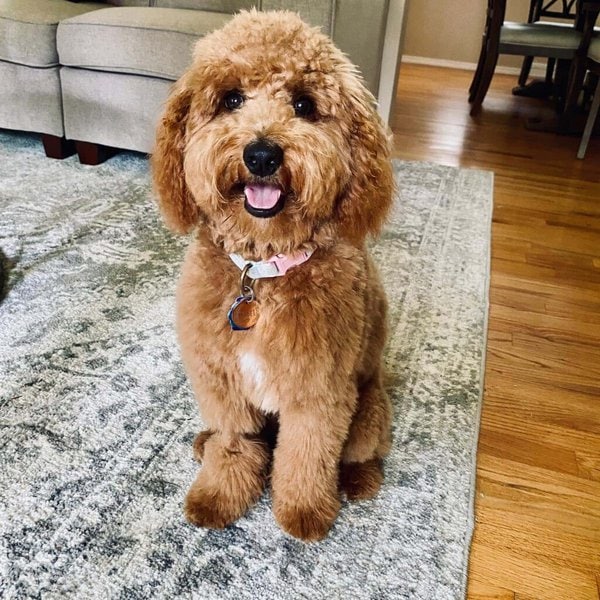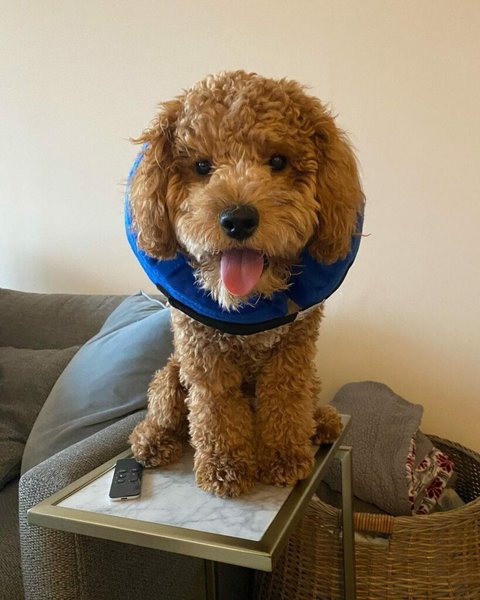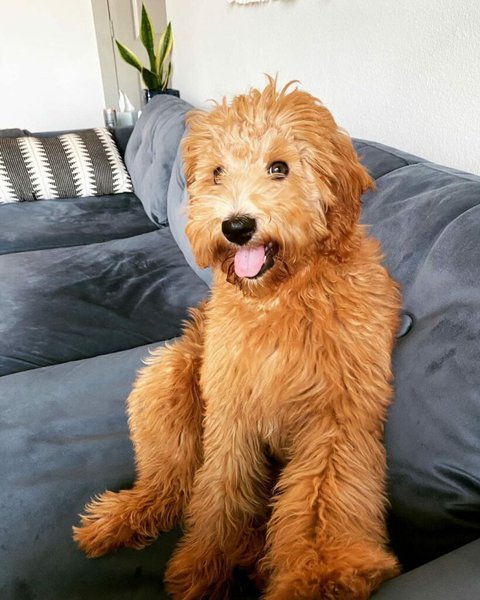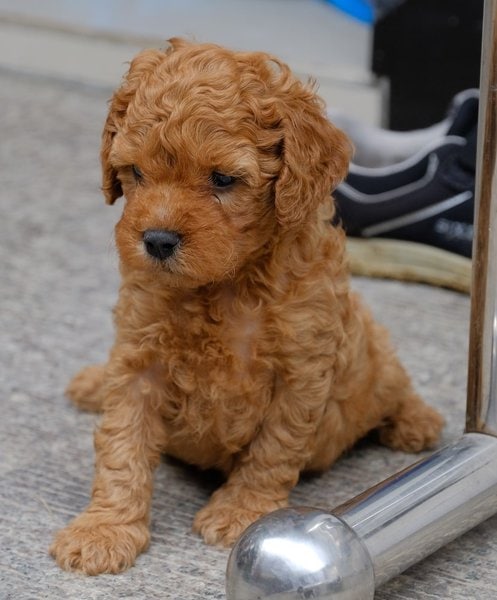A Petite Goldendoodle is a designer hybrid dog. This canine, a mix of the American Cocker Spaniel, the Golden Retriever with the Miniature Poodle, is intelligent, grows to varied adult sizes, and enjoys a longer lifespan than its parent breeds.
Also known as the Petite Groodle, Petite Goldenpoo, or Petite Curly Retriever, your doggie can grow into a standard, miniature, or toy canine at maturity, depending on the size of the parent Poodle. We will also address the grooming needs, touch on the level of care needed, share the potential health concerns, as well as interesting things about this pooch.
In this breed guide, we discuss the important considerations like the daily care regime required and the best grooming practices to adopt. You will also understand various Petite Goldenpoo temperaments, necessary training activities, and the general maintenance that suits your doggie. But first, let’s address the question on size.
How Big Does A Petite Goldendoodle Get?
The Petite Curly Retriever is a small to medium doggie, with your adult pooch growing to about 10 to 24 inches in height. Both adult female and male canines will weigh between 20 to 35 lbs.
How Do You Get A Petite Goldendoodle?
To produce a Petite Goldendoodle puppy, a breeder must crossbreed not two but three purebred dog breeds. We advise certified breeders to stick by the recommended breeding mix proportions consisting 25% Golden Retriever, 25% American Cocker Spaniel, and 50% Miniature Poodle.
The resulting Petite Groodle puppy will be more resilient to common diseases and enjoy a longer lifespan than in another similar puppy but of a different mix proportions which the breeder has tinkered with.
At What Age Is A Petite Goldendoodle Full Grown?
A healthy Petite Goldendoodle canine buddy will grow fast, reaching full adult weight at about 11 to 13 months old. In fact, your puppy’s growth curve increases at an exponential rate, such that your dear fido will be half their adult weight at 3 to 5 months old.
The growth rate then slows down slightly until the 11 to 13 months range, after which your furry companion will plateau out at adult weight. When dealing with a bigger canine, however, your Petite Goldenpoo will reach its full grown weight much later, typically between 12.5 to 16 months.
In relation to breeding age, we recommend that you wait until your dear fido is 2 years old, at which time the second or third heat cycle will be setting in.

What Is The Average Lifespan Of A Petite Goldendoodle?
We are often asked how long a Petite Groodle will live, especially by would-be owners keen to avoid the pain of losing a dear fido too soon.
On average, a Petite Groodle has a life expectancy of 10 to 15 years. However, this canine’s health and susceptibility to certain diseases will influence its actual lifespan, so providing proper care is the right step to extending its lifespan.
Do Petite Goldendoodles Have Health Issues?
Your Petite Goldendoodle contends with varied health issues, most of which are inherited from the parents or prevalent in the parent breeds. Unlike most hybrid doggies, this canine has no known major dog health concerns, except hip dysplasia in rare situations which will only impact its mobility.
However, selective cross breeding makes the offspring tougher and more resilient to genetic diseases, meaning your doggie should live longer and demand less specialized care. The following are some of the most common health concerns this pooch will face:
Von Willebrand Disease
This hereditary condition results from deficiency in protein plasma, and causes blood clotting disorders that leave your doggie susceptible to excessive bleeding even from superficial wounds.
Progressive Retinal Atrophy
This is an inherited condition that causes your dear fido’s retina to degenerate with age, resulting in partial or total blindness in later stages.
Gastric Dilatation-Volvulus
Commonly called bloat, this condition involves your furry companion’s stomach filling with gas, fluids, or food, which expands strenuously to cause pain due to pressure on other internal organs. You can prevent bloat through a proper diet.
Patellar Luxation
This is a condition widely considered to be prevalent amongst Toy Goldendoodles and Miniature Goldendoodles, and it causes knee dislocations during movement, leading to injuries.

How To Take Care Of Your Petite Goldendoodle?
Regarding how to take care of your Petite Goldendoodle, we recommend creating a customized care regime that encompasses physical exercise, approved diet, and varied dietary supplements, alongside warmer bedding during the winter.
Exercise Routine
Petite Goldendoodles are moderately active doggies beyond their formative years. As such, your pooch doesn’t require intense maintenance like most other breeds.
Still, your four-legged furry friend needs sufficient exercise given their active nature. We advise physical activity of at least 45 minutes every day. This can include guided exercises like agility training, and common social games like fetch, seek and find, or frisbee.
However, do not subject your Petite Goldendoodle to excessive exercise or physically demanding activities that will stress its small body. We have found that short, daily walks are sufficient, and you can also create a small fenced playing area and allow the doggie to do unmetered jogs, plays, and romping about the home.
High-Quality Diet
On average, your Petite Goldendoodle pooch needs 1 to 4 cups of high-quality, multi-nutritional food, served 3 to 4 times every day. The feeding frequency depends on your doggie’s size and health, with 2 meals of 1 to 2 cups of dog food enough after the sixth month.
The regular diet should be rich in protein, multivitamins, fiber, and fats. Do not feed your dear fido on human food to avoid bloat, weight gain, and discourage “begging tendencies”.
We recommend Pet Plate, a high-quality dog food beef recipe loaded with high protein and free of grain.
Further, use recommended dental water additives to ensure better oral hygiene, including fresh breath, prevent bacterial buildup, and fight plaque.
Are Petite Goldendoodles Good Dogs? Temperaments Of Petite Goldendoodles
Definitely, Petite Goldendoodles are good dogs and make fantastic family pets. These small doggies require minimal space, have a great temperament, as well as offer great companionship with other animals around the home.
Your dear fido is also vibrant and friendly, and provides warm good company for the family. Indeed, we recommend would-be new doggie owners to acquire a gentle and easy to maintain puppy.
Temperaments Of Petite Goldendoodles
The Petite Goldendoodle is a loving friend loyal to the family. With moderate activity and naturally obedient, this canine buddy displays an inquisitive and protective nature belying their small stature.
Given their moderate energy and activity levels, your dear fido is not aggressive towards people or other animals and is very intelligent in dealing with their environment. Therefore, your Petite Goldendoodle’s core temperaments are;
- Intelligent
- Non-Aggressive
- Loving
- Loyal
- Obedient
- Inquisitive
- Protective
Do Petite Goldendoodles Bark A Lot?
Your four-legged furry friend can be loud and vocal at times or especially when excited, happy, bored, or alerted to unusual or unknown noises. However, you can train your Petite Groodle to exercise impulse control and bark less, but we reckon this doggie won’t stay quiet most of the time.
Do Petite Goldendoodles Like To Cuddle?
Your Petite Goldendoodle will like cuddles due to their outgoing and playful nature, and their love for being petted.
Furthermore, your doggie enjoys close interactions with people, particularly children, such that it can be sensitive to the owners’ tone of voice, scent, and other characteristics, thereby making it an accomplished therapy doggie when properly trained.

Are Petite Goldendoodles High Maintenance? Grooming Tips For Petite Goldendoodles
The Petite Goldendoodle is not considered to be a high maintenance doggie as it sheds minially. Despite its dense, wavy, and curly coat characteristics, it is not hypoallergenic.
Depending on the dominant curl gene, the Petite Groodle can end up either in a straight, wavy, or curled coat. Its characteristically long coat with furnishings is often due to the long hair genes inherited from Poodles or Golden Retrievers.
Grooming Tips For Petite Goldendoodles
We advise brushing your doggie twice every week to remove debris, loose hairs, and matting. This will also help spread natural coat oils that ensure a soft coat throughout.
Only use specialized grooming tools such as the Furminator Undercoat Tool for deshedding your pooch to remove all loose hairs and combat shedding.
The long coat must be clipped to avoid matting. Ensure to trim evenly at 1 to 2 inches long so the coat is easy to groom while offering sufficient protection. Trim your canine’s toenails at least twice a year.
Use an approved canine ear wash solution and a clean cotton ball to clean the ears weekly. For bathing, the Pro Pet Works All Natural 5 In 1 Oatmeal Shampoo helps with allergies and sensitive, dry skins, and will suit your Petite Goldendoodle grooming needs.
For the best dental care, bush your Petite Goldendoodle’s teeth 2 to 3 times a week to avoid periodontal disease, tooth loss, or bad breath. While rare, also watch out for drooling and clean the teeth as needed.
Related Questions
How Much Does A Petite Goldendoodle Cost? A Petite Goldendoodle, or Petite Curly Retriever, will cost between $1,600 and $2,600. The final price often depends on breeder pedigree and location, parental breed quality, and amount of training received. Reputable breeders also provide prior tests for hereditary illnesses, veterinary records, and a health guarantee.
Are Petite Goldendoodles Natural Swimmers? Your dear fido can swim, but your furry companion is not a natural swimmer and will need training. Your pooch likes water though, and can be trained to increase in-water endurance. Your doggie’s size and age determine its swim-time, with Petite Goldendoodle puppies more energetic.
What Is The Smallest Goldendoodle Called? A Micro Goldendoodle, the smallest of Goldendoodle doggies, is an ultra-small canine that grows no more than 12 inches tall and weighs between 5 to 10 lbs. This doggie mix also goes by many popular names, such as the ‘micro petite doodle’, ‘micro doodle’, or ‘micro mini doodle’.





